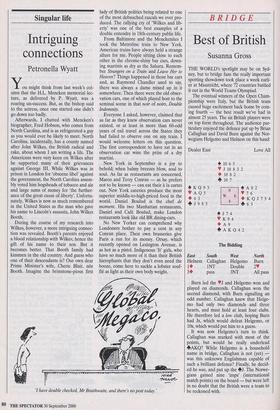Singular life
Intriguing connections
Petronella Wyatt
You might think from last week's col- umn that the H.L. Mencken memorial lec- ture, as delivered by P. Wyatt, was a roaring un-success. But, as the bishop said to the actress, once one started one didn't go down too badly.
Afterwards, I chatted with Mencken's biographer, Fred Hobson, who comes from North Carolina, and is as refrigerated a guy as you would ever be likely to meet. North Carolina, incidentally, has a county named after John Wilkes, the British radical and rake, about whom I am writing a life. The Americans were very keen on Wilkes after he supported many of their grievances against George III. While Wilkes was in prison in London for 'obscene libel' against the government, the North Carolina assem- bly voted him hogsheads of tobacco and ale and large sums of money for 'the further- ance of the great cause of liberty'. Unfortu- nately, Wilkes is now as much remembered in the United States as the man who gave his name to Lincoln's assassin, John Wilkes Booth.
During the course of my research into Wilkes, however, a more intriguing connec- tion was revealed. Booth's parents enjoyed a blood relationship with Wilkes; hence the gift of his name to their son. But it becomes better. That Booth family had kinsmen in the old country. And guess who one of their descendants is? Our own dear Prime Minister's wife, Cherie Blair, née Booth. Imagine the brimstone-pious first lady of British politics being related to one of the most debauched rascals we ever pro- duced. The rallying cry of 'Wilkes and lib- erty' was one of the best examples of a double entendre in 18th-century public life.
From Baltimore and the Menckenites I took the Metroline train to New York. American trains have always held a strange allure for me. People sitting close to each other in the chrome-shiny bar cars, down- ing martinis as dry as the Sahara. Remem- ber Strangers on a Train and Leave Her to Heaven? Things happened in those bar cars and, as Raymond Chandler used to say, there was always a dame mixed up in it somewhere. Then there were the old obser- vation cars, one of which played host to the seminal scene in that noir of noirs, Double Indemnity.
Everyone I asked, however, claimed that as far as they knew observation cars never existed, or at least in more than 60-odd years of rail travel across the States they had failed to observe one on any train. I would welcome letters on this question. The first correspondent to have sat in an observation car wins the prize of a dry martini.
New York in September is a joy to behold; when balmy breezes blow, soul to soul. As far as restaurants are concerned, Marco and Terry Conran — as he prefers not to be known — can eat their a la cartes out. New York eateries produce the most superior middle-to-high-priced food in the world. Daniel Boulud is the chef de moment. His two Manhattan restaurants, Daniel and Café Boulud, make London restaurants look like old BR dining-cars.
No New Yorker can comprehend why Londoners bother to pay a cent in any Conran place. Their own brasseries give Paris a run for its money. Orsay, which recently opened on Lexington Avenue, is as hot as a pistol. Indigenous 'It' girls, who have so much more of it than their British hierophants that they don't even need the booze, come here to suckle a lobster souf- flé as light as their own body weight.
I have double checked Mr Braithwaite, and there's no post today.'


























































































 Previous page
Previous page